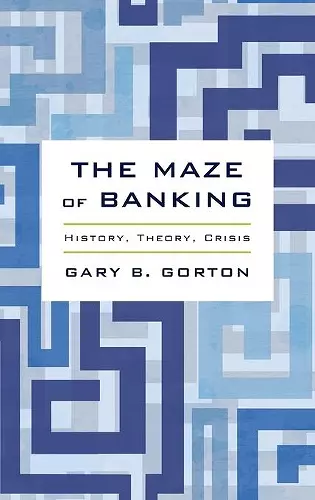The Maze of Banking
History, Theory, Crisis
Format:Hardback
Publisher:Oxford University Press Inc
Published:16th Apr '15
Currently unavailable, and unfortunately no date known when it will be back

Financial crises are devastating in human and economic terms. To avoid the next one, it is important to understand the recent financial crisis of 2007-2008 and the financial eras which preceded it. Gary Gorton has been studying financial crises since his 1983 PhD thesis, "Banking Panics." The Maze of Banking contains a collection of his academic papers on the subjects of banks, banking, and financial crises. The papers in this volume span almost 175 years of U.S. banking history, from pre-U.S. Civil War private bank notes issued during the U.S. Free Banking Era (1837-1863); followed by the U.S. National Banking Era (1863-1914) before there was a central bank; through loan sales, securitization, and the financial crisis of 2007-2008. Banking changed profoundly during these 175 years, yet it did not change in fundamental ways. The forms of money changed, resulting in associated changes in the information structure of the economy. Bank debt evolved as an instrument for storing value, smoothing consumption, and transactions, but its fundamental nature did not change. In all its forms, it is vulnerable to bank runs without government intervention. These papers provide the framework for understanding how the financial crisis of 2007-2008 developed and what can be done to promote a stabile banking industry and prevent future economic crises.
"Gary Gorton is a master at combining financial history and economic theory. His work has been invaluable in illuminating the deep causes of financial crises and in helping to guide the policy response." Ben S. Bernanke, Distinguished Fellow in Residence, Economic Studies Program, Brookings Institution and Former Chairman of the Federal Reserve "The Maze of Banking demonstrates the great depth and relevance of Gary Gorton's research on banking and financial crises. Gary's research combines insights from modern economic theory and the insights of fresh empirical work guided by the techniques of economic history. By coming at an understanding of the financial system from two very different methodologies, Gorton's research produces insights about the past which are both new and still empirically valid in the modern financial system. Reading Gary's collected works together yields new lessons which were unclear from reading them separately over the years. The whole does appear to be greater than the sum of the individual parts." Douglas W. Diamond, Merton H Miller Distinguished Service Professor, Booth School of Business, University of Chicago "Read this anthology of papers written over the past thirty years and you will understand why Gary Gorton has been the leading voice in explaining the recent financial crisis. The sweeping perspective provides the basis for a coherent, comprehensive interpretation of current events, devoid of undue emotion and hasty conclusions. The Maze of Banking is a testimony to the depth of Gorton's analysis and the perseverance of his research." Bengt Holmström, Paul A. Samuelson Professor of Economics, Massachusetts Institute of Technology "To understand banking and financial crises, especially in their historical context, you really need to read Gary Gorton. Insights leap from every page." Mervyn King, former Governor of the Bank of England "Gary Gorton is unique in his ability to bring together fundamental insights from both history and theory to shed light on the essential nature of-and the risks created by-financial intermediation. The papers in this volume make it clear why he has been one of the most important voices on one of the most pressing economic policy issues of our time." Jeremy C. Stein, Department of Economics, Harvard University and Former Member of the Federal Open Market Committee
ISBN: 9780190204839
Dimensions: 236mm x 170mm x 51mm
Weight: 1021g
690 pages